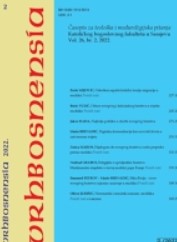NAJBOLJE POLITIKE U SLUŽBI SVEOPĆEG BRATSTVA
THE BEST POLICIES IN THE SERVICE OF UNIVERSAL BROTHERHOOD
Author(s): Jakov RađaSubject(s): Christian Theology and Religion, Politics and religion, Biblical studies, Systematic Theology
Published by: Katolički bogoslovni fakultet
Keywords: Fratelli tutti; politics; brotherhood; friendship;
Summary/Abstract: The encyclical Fratelli tutti can be considered as an important hermeneutic key for understanding the pontificate of Pope Francis, because he began his papal ministry with a prayer for brotherhood in the world, and now he has approached the topic of brotherhood in a comprehensive and engaged way. At a time when the ecological crisis is spilling over into endangering fundamental relationships between people, and between peoples and nations, the Pope has made his own syntagma of St. Francis – Fratelli tutti. The encyclical, in addition to its theological character, has a pronounced political aspect that extends throughout the document, which aims to influence a change in political understanding and also in the consciousness and conscience of those who deal with politics. The Pope’s intention, of course, is not to write a political manifesto for the Church or to take a political side, but to offer inspiration to politicians and influence the formation of a new political culture with the Gospel. The inspiration that the encyclical Fratelli tutti sets out to provide for politics and politicians is summarized in four criteria for the renewal of political action, namely: interpreting the sentiments of the people in order to enable the search for the common good (cf.: FT 159), promoting the culture of work (cf.: FT 161), giving preference to the last (cf.: FT 187), and cultivating a spirit of openness to all (cf.: FT 190). Starting from these criteria, Pope Francis formulates the positions that good politics should advocate, namely: giving priority to the general use of goods in relation to private property (cf.: FT 120), positive discrimination toward poor and underdeveloped countries (cf.: FT 138 ), the priority of multilateral policy in relation to bilateral policy (cf.: FT 153), the acceptance and integration of migrants (cf.: FT 129), the inclusion of minorities in the broader concept of citizenship (cf.: FT 131), and the exclusion of war as a political option (cf.: FT 257-258).
Journal: Vrhbosnensia
- Issue Year: 2022
- Issue No: 2
- Page Range: 271-290
- Page Count: 20
- Language: Croatian

